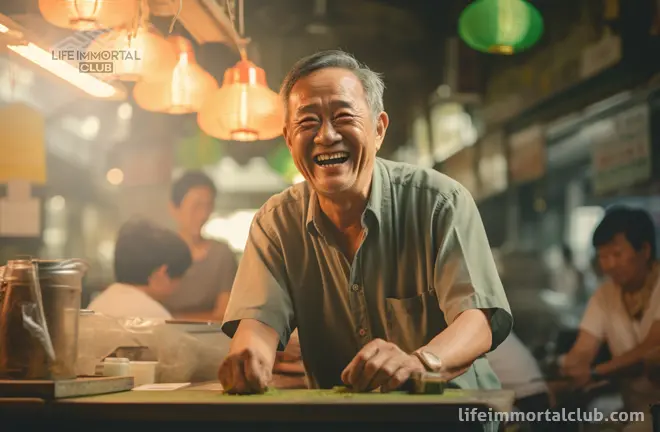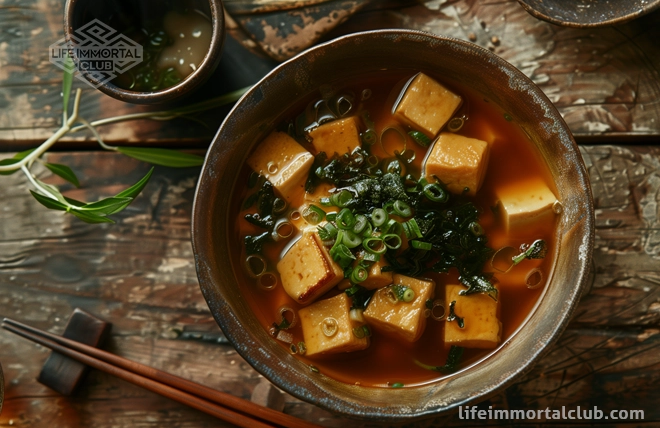Why Are Some People Considering Singapore A New Blue Zone?

Table of Contents
- How to Live Long Lives, Like Singaporeans
- The Secrets Behind Singaporeans' Longevity
- Singaporeans Move Naturally
- Singaporeans Have A Sense of Purpose
- Singaporeans Downshift To Slow-Paced Lives
- Singaporeans Have An 80% Rule To Prevent Over-Eating
- What Can We Learn About Longevity From Singapore?
- Does Singapore Deserve This New Designation Of Blue Zone?
How to Live Long Lives, Like Singaporeans
Singapore, a bustling city-state nestled in Southeast Asia, has recently garnered attention for its impressive life expectancy and the overall well-being of its population. Many people are intrigued by the question: How do Singaporeans manage to live such long lives? In this article, we will explore the various factors that contribute to the longevity of Singaporeans and unveil some secrets that might hold the key to living a long and prosperous life.
One cannot overlook the importance of Singapore's robust healthcare system. The nation boasts a world-class healthcare infrastructure that ensures its citizens have access to quality medical facilities and services.
From preventive healthcare programs to advanced treatments for chronic diseases, Singaporeans benefit from comprehensive healthcare coverage. Regular health check-ups and early detection of potential health issues are encouraged, enabling individuals to address any concerns promptly.
As you stroll through the city streets or visit one of its numerous parks and gardens, it becomes evident that Singaporeans embrace an active lifestyle. With an extensive network of walking paths, cycling tracks, and recreational spaces, residents have ample opportunities to engage in physical activities.
Singapore's recipe for a long and healthy life encompasses several key elements: a robust healthcare system, an active lifestyle, and a nutritious diet. Through their commitment to maintaining holistic well-being, Singaporeans have unlocked the secret to living longer lives.
By adopting the principles of preventive healthcare, engaging in regular physical activity, and embracing wholesome eating habits, people around the world can learn valuable lessons from Singapore's success story. In the subsequent sections of this article, we will delve deeper into other aspects that contribute to Singapore's designation as a potential new Blue Zone and explore how these factors collectively play a role in enhancing longevity and overall well-being.
The Secrets Behind Singaporeans' Longevity
The Secrets Behind Singaporeans' Longevity Singapore has garnered attention and is being considered a new Blue Zone due to its remarkable longevity statistics.
The city-state boasts one of the highest life expectancies in the world, with Singaporean men living an average of 81.4 years and women reaching an impressive 86.1 years. These remarkable figures have led researchers to delve into the secrets behind Singaporeans' longevity, revealing key factors that contribute to their extended lifespans.
One significant aspect is the emphasis on a healthy diet in Singaporean culture. Traditional cuisine is largely centered around fresh fruits and vegetables, lean proteins, and whole grains.
Fish is particularly prevalent in their meals, providing essential omega-3 fatty acids beneficial for heart health and brain function. Additionally, Singaporeans consume a wide variety of herbs and spices known for their medicinal properties, such as turmeric, ginger, and garlic.
Another secret to Singaporeans' longevity lies in their active lifestyle. Regular physical activity is deeply ingrained in their daily routines.
Walking is highly encouraged due to the city's excellent infrastructure with pedestrian-friendly pathways and parks throughout metropolitan areas. Many Singaporeans also engage in activities like tai chi or yoga for strength-building and flexibility maintenance well into old age.
Furthermore, social connections play a fundamental role in enhancing overall well-being among Singaporeans, contributing to their longer lives. The concept of "kampong spirit," reminiscent of close-knit village communities where everyone looked out for one another's welfare, still exists within neighborhoods across Singapore today.
Strong family ties are also deeply valued, with multi-generational households commonly found where grandparents actively participate in childcare and families frequently gather for shared meals. The secrets behind Singaporeans' longevity encompass multiple aspects that contribute to their exceptional life expectancy rates.
Their nutritional habits centered around fresh ingredients rich in nutrients undoubtedly play a vital role in maintaining good health over time. The incorporation of physical activity into daily life ensures Singaporeans remain physically fit and agile well into their later years.
The strong social connections within their communities foster a sense of belonging and support, promoting overall well-being. By understanding and adopting these secrets, we can potentially improve our own longevity and lead healthier, more fulfilling lives.
Singaporeans Move Naturally
One of the key factors contributing to the consideration of Singapore as a new Blue Zone is the natural movement that is deeply ingrained in the daily lives of its people.
Unlike many modern societies where sedentary lifestyles have become commonplace, Singaporeans incorporate physical activity into their day-to-day routines effortlessly. From walking and cycling to utilizing public transportation and engaging in recreational activities, movement is an integral part of their lifestyle.
Walking is particularly cherished and widely practiced among Singaporeans. The city-state boasts meticulously planned urban spaces with well-connected sidewalks, pedestrian-friendly bridges, and parks that encourage people to walk.
Whether it's strolling through lush green gardens or taking leisurely walks along Marina Bay, Singaporeans have easy access to numerous picturesque locations that beckon them outdoors. The government's commitment to creating a walkable city has resulted in a culture where walking becomes a pleasurable habit rather than a chore.
Another significant aspect of natural movement in Singapore is the popularity of cycling. The city-state has embraced cycling as an eco-friendly mode of transportation and leisure activity.
With an extensive network of cycling paths spanning across the island, it's common to see individuals commuting to work or exploring scenic routes on their bicycles. Cycling not only promotes physical fitness but also reduces traffic congestion and carbon emissions, aligning perfectly with Singapore's vision for sustainability.
Apart from walking and cycling, participation in recreational activities further contributes to Singaporeans' active lifestyle. Parks are abundant throughout the country, allowing residents easy access to outdoor exercise spaces where they can engage in activities like tai chi or yoga.
This emphasis on physical activity as an inherent part of everyday life sets them apart from societies where sedentary habits have become the norm. Singapore's commitment to creating a walkable city and providing infrastructure for cycling further reinforces their dedication to fostering a culture of movement, ultimately earning them recognition as a new Blue Zone.
Singaporeans Have A Sense of Purpose
Singaporeans Have A Sense of Purpose One key factor contributing to the longevity of Singaporeans is their strong sense of purpose. Singapore is known for its high level of discipline and work ethic, which instills a sense of purpose in its people.
From a young age, Singaporean children are encouraged to set goals and work hard to achieve them. This cultural emphasis on purposeful living translates into adulthood, where many Singaporeans find meaning in their careers and personal pursuits.
In the workplace, Singaporeans are driven by a desire to contribute to society and make a difference. They value the impact they can have on their community and take pride in their work.
This sense of purpose not only motivates them but also provides them with a reason to wake up every morning with enthusiasm. Whether they are doctors saving lives or teachers shaping young minds, Singaporeans believe that their contributions matter and strive to leave a positive legacy.
Outside of work, Singaporeans also seek purpose through activities that give back to society or align with their personal values. Many engage in volunteer work, supporting causes close to their hearts such as education, healthcare, or environmental conservation.
By dedicating their time and resources towards meaningful endeavors, they find fulfillment beyond material success. This strong sense of purpose also extends into family life.
Family is highly valued in Singaporean culture, and individuals prioritize nurturing relationships with loved ones as part of their overall purpose in life. From spending quality time together during meals or engaging in recreational activities as a family unit, these moments contribute to a deeper connection and reinforce the value system that guides Singaporeans towards leading fulfilling lives.
Overall, the sense of purpose deeply ingrained in the fabric of Singaporean society plays an instrumental role in promoting longevity among its population. It drives individuals toward meaningful careers that bring satisfaction while also nurturing strong family bonds that provide emotional support and stability throughout life's journey.
Singaporeans Downshift To Slow-Paced Lives
Living in a fast-paced world, where stress and pressure seem to be the norm, many individuals are seeking ways to slow down and find balance in their lives. Singaporeans, however, have long understood the importance of downshifting and embracing a slower-paced lifestyle. This aspect of their culture has contributed significantly to their well-being and longevity.
One key element of Singaporeans' slow-paced lives is their emphasis on work-life balance. Unlike many other bustling metropolises around the world, Singapore promotes a healthy separation between work and personal life.
Companies in Singapore prioritize employee well-being by offering flexible working hours, generous vacation time, and encouraging employees to take breaks throughout the day. This allows Singaporeans to focus on self-care, spend quality time with family and friends, pursue hobbies or engage in leisure activities that bring them joy.
In addition to work-life balance, Singaporeans also prioritize rest and relaxation. It is common for Singaporeans to incorporate regular periods of downtime into their daily routines.
Whether it's enjoying a cup of tea at a local hawker center or taking an afternoon nap known as "shi shui" (resting for a short while), these moments allow for rejuvenation amidst the busyness of daily life. By consciously setting aside time for rest and relaxation each day, Singaporeans are able to reduce stress levels and maintain overall well-being.
Furthermore, slowing down also means savoring the simple pleasures in life. In an era dominated by instant gratification and constant stimulation from technology, Singaporeans appreciate the value of taking things slowly and being present in each moment.
They often engage in activities that promote mindfulness such as practicing yoga or meditation at serene locations like Gardens by the Bay or Sentosa Island. By immersing themselves fully in these experiences without rushing or multitasking, they cultivate a sense of calmness and appreciation for the beauty around them.
One cannot underestimate the impact of a slow-paced lifestyle on health and longevity. Singaporeans understand the importance of downshifting and have integrated practices such as work-life balance, restful breaks, and mindfulness into their lives.
By embracing these principles, they effectively reduce stress, enhance well-being, and contribute to their overall longevity. As the world becomes increasingly fast-paced, there is much to learn from Singaporeans' approach to life – a reminder that slowing down can bring us closer to a more fulfilling existence.
Singaporeans Have An 80% Rule To Prevent Over-Eating
One of the intriguing aspects of Singaporean culture that has caught the attention of researchers studying longevity is their unique approach to eating: the 80% rule.
This principle revolves around the idea of practicing moderation and leaving a little space for hunger after each meal. Singaporeans have embraced this rule as a means to prevent overeating and maintain a healthy weight.
The 80% rule is a simple but powerful concept that encourages individuals to stop eating when they feel about 80% full, rather than consuming until they are completely stuffed. This practice aligns with the traditional wisdom of Asian cultures, emphasizing balance and harmony in all aspects of life, including food consumption.
By stopping short of feeling overly satiated, Singaporeans avoid overloading their digestive systems and provide sufficient room for proper digestion. Moreover, the 80% rule also allows for more mindful eating habits.
When individuals consciously pay attention to their body's signals during meals, they become more aware of their level of satisfaction and can make informed decisions about when to stop eating. This practice cultivates a deeper connection between mind and body, fostering a healthier relationship with food.
Singapore's cultural emphasis on communal dining further contributes to the effectiveness of the 80% rule in preventing overeating. Shared meals are common in Singaporean households or when dining out with friends and family.
In these social settings, multiple dishes are ordered and placed at the center of the table for everyone to enjoy together. By sharing dishes with others, individuals naturally eat smaller portions while still being able to taste a wide variety of flavors.
Singaporeans' adherence to the 80% rule is an important factor contributing to their overall health and longevity. This principle promotes mindful eating practices by encouraging individuals to listen closely to their bodies' signals during meals.
By practicing moderation and leaving room for hunger after each meal, Singaporeans successfully prevent overeating and maintain healthy eating habits. The 80% rule, along with other cultural practices, may hold valuable lessons for individuals seeking to improve their own dietary habits and live longer, healthier lives.
What Can We Learn About Longevity From Singapore?
What Can We Learn About Longevity From Singapore?
- A Balanced Diet: One of the key factors contributing to Singaporeans' longevity is their diet. Singaporeans have a well-balanced diet that includes a variety of fresh vegetables, lean proteins, and whole grains.Their meals are usually low in saturated fats and high in fiber, providing them with essential nutrients while keeping their calorie intake in check. The emphasis on consuming a colorful array of fruits and vegetables ensures they receive a wide range of vitamins, minerals, and antioxidants that promote overall health.
- Active Lifestyle: Another significant aspect we can learn from Singaporeans when it comes to longevity is their commitment to leading an active lifestyle. Despite being a highly urbanized city-state, Singapore offers numerous parks, gardens, and recreational facilities where residents can engage in physical activities like walking, jogging, cycling, or practicing tai chi.The government has also invested heavily in promoting sports and fitness programs for all age groups. In addition to planned exercise routines, many Singaporeans incorporate movement into their daily lives naturally.
- Stress Management: Singaporeans recognize the importance of managing stress as an integral part of maintaining good health and longevity. Despite living amidst a fast-paced urban environment filled with work pressures and tight schedules, they actively seek ways to manage stress effectively. Mindfulness practices such as meditation and yoga have gained popularity in Singapore, with many individuals regularly incorporating these techniques into their daily routines.
These somewhat simple approaches significantly contribute to their overall longevity and well-being, and due to this, Singapore offers valuable insights into the factors contributing to human longevity.
Does Singapore Deserve This New Designation Of Blue Zone?
Singapore's potential as a Blue Zone has ignited discussions among longevity experts. Despite impressive life expectancy rates, a holistic evaluation is necessary to determine if it qualifies. A key factor is Singapore's robust healthcare system, providing accessible medical services through hospitals, clinics, and healthcare professionals.
This accessibility promotes timely preventive care and interventions, contributing to longevity. The government's emphasis on public health encourages physical activity through fitness programs, parks, and community events. These efforts promote healthy habits like regular exercise and balanced nutrition.
Singapore's diverse culinary scene features nutritious options with fresh ingredients and traditional cooking methods. Communal dining fosters social connections, vital for well-being. However, challenges like rising rates of chronic diseases require addressing sedentary lifestyles, stress, and poor diets.
While Singapore's healthcare system, public health initiatives, and cultural practices support well-being, ongoing efforts are needed to combat emerging health challenges. By focusing on prevention, promoting healthier lifestyles, and addressing chronic diseases, Singapore can further solidify its position as a global leader in longevity and healthy aging.
Conclusion
Singapore's potential as a new Blue Zone is well-deserved. The blend of lifestyle and cultural practices among its people offers valuable lessons in promoting longevity and overall well-being. Emphasizing natural movement, finding purpose, adopting a slower pace, and mindful eating are all vital contributors to Singaporeans' impressive longevity. They have success in fostering a health-promoting environment can inspire other nations. Urban planning that encourages physical activity, community engagement opportunities, and cultural values promoting balance and mindfulness can benefit societies globally.
While no single approach guarantees a longer life, Singapore's achievements offer hope and motivation for individuals. Embracing regular exercise, finding purpose, slowing down to savor moments, and practicing mindful eating can enhance our chances of a healthier, longer life.
As Singapore's potential as a Blue Zone looms, it's clear we have much to learn from this thriving city-state. Their ability to prioritize well-being while embracing modernity is truly remarkable.
Let's celebrate Singapore's achievements as proof of what's possible when societies prioritize holistic health and balanced living. May we draw inspiration from their example as we journey toward longevity and fulfillment.
Discover More Useful Information On Common Traits Of Blue Zones







